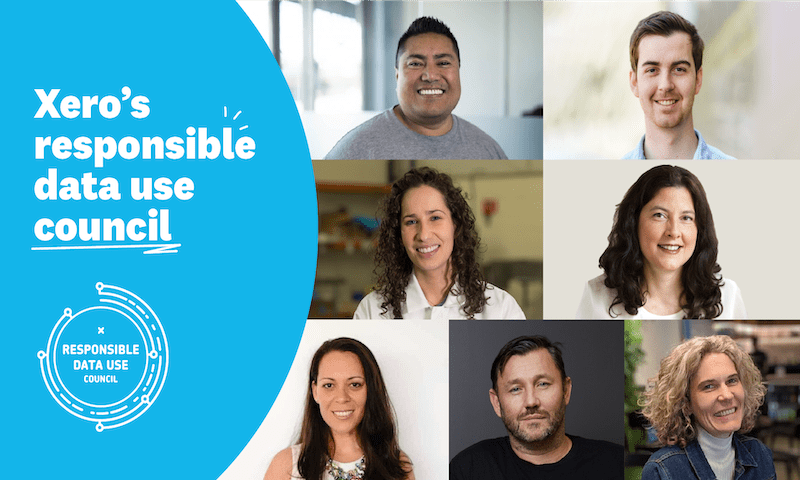

Thanks to the power of technology, Xero’s Responsible Data Use Advisory Council recently came together on Zoom across five time zones for our first meeting to progress the discussion around responsible data use. Our discussion focussed on how we can work together to improve the knowledge and guide the actions of small business owners and their advisors on the topic.
Our council includes voices from many perspectives in the small business community so we were able to have a dynamic and robust conversation on many issues surrounding responsible data use. Our council includes myself, Samuel Burmeister of Tall Books (advisor), Laura Jackson of Popcorn Shed (business owner), Maribel Lopez of Lopez Research (analyst), Wyndi and Eli Tagi of WE Accounting (advisors) and Aaron Wittman of XBert (app developer).
Bridging the knowledge gap
We began by talking about the knowledge gaps we see among business owners and consumers when it comes to understanding what responsible data use is, what it means for small businesses and the benefits to be gained by all community participants when data is used responsibly.
In our recent survey of small business owners around the world, just over half (54%) share no data with their tech providers. A key reason this figure is so low may be a lack of understanding about the benefits of sharing data with SaaS providers that use it responsibly, combined with the doubt and uncertainty created by occasional, highly publicised, poor practice. In fact, only 17% of small business owners told us that they completely understand what tech providers do with their data beyond delivering services or products, while 27% said they ‘somewhat understand’.
Council members agreed on the need for better information and greater levels of data literacy to address the low awareness and fear of data sharing among the small business community. As Samuel Burmeister said, “I think we really need to educate first on what data is, why our clients should care about it and how this relates to their Xero use.”
Understanding control and consent
When it comes to how small business owners and their advisors consent to, and control, how their data is shared, we agreed there is a significant opportunity to help them better understand how their data will be used by tech providers – and what permissions they give to tech providers when it comes to sharing their data with others.
Generally, those processes are explained in a provider’s terms and conditions (T&Cs). However, our survey shows that only 28% of small business owners read them. Moreover, 60% have trouble understanding some or all of the T&Cs they encounter. This may stem from a lack of technical knowledge but also points to the need for tech providers to make their T&Cs more digestible.
As Maribel Lopez stated, “It’s interesting to look at what options tech providers give their customers, if they do give options. If companies have our data and we, as customers, say it’s okay for them to have the data, where does it go from there?”
Wyndi Tagi added: “There’s a lot of talk about financial literacy. Similarly, we need a whole new type of literacy about what people are reading and seeing around their data sharing options.”
Keeping data private and secure
Data privacy and security are top of mind for small business owners and their advisors. Yet as time-poor users, there are conflicting needs when it comes to data safety versus convenience.
While data privacy and security are crucial to responsible data use, our council members agreed that stringent security measures can sometimes disrupt the user experience. As an example, we spoke about multi-factor authentication. Although it acts as an additional security measure for the benefit and safety of customers, some users find it frustrating to go through extra steps to securely access their account. We identified this balance between security and convenience to be one part of the fundamental knowledge gap that the council will address for the small business community; helping to highlight and explain why there’s no room for compromise when it comes to data security.
We also spoke about trust in data sharing. Interestingly, while 65% of our survey respondents said their tech providers do all they can to keep their business’ data secure, 76% of them believe sharing data with anyone outside their organisation is a risk. Leaning on first-hand experience working with business owners, Eli Tagi further highlighted this knowledge gap, suggesting, “Many business owners don’t fully understand what they are giving up and what their data is being used for.”
What comes next?
Building on our first meeting, our council is committed to providing practical advice and education that will cover topics including:
- The many types of business data that exist and what it means to use it responsibly – not to mention the benefits we can all gain when it is shared safely
- How to better understand and manage consent and control of data, and the key points to consider when asked to share your data
- The best practices small business owners and their advisors should look for in their tech providers when it comes to data privacy and security
- Key considerations for developers when it comes to using data responsibly
As we continue to rely on and incorporate technology into our businesses in a hyper-connected, yet physically distanced, world in the wake of a global pandemic, we all agreed that now is a crucial time to demystify data for small business owners and their advisors so they can better understand the most important facets of responsible data use and benefit from the power of data.







